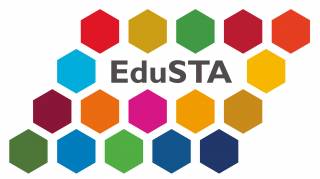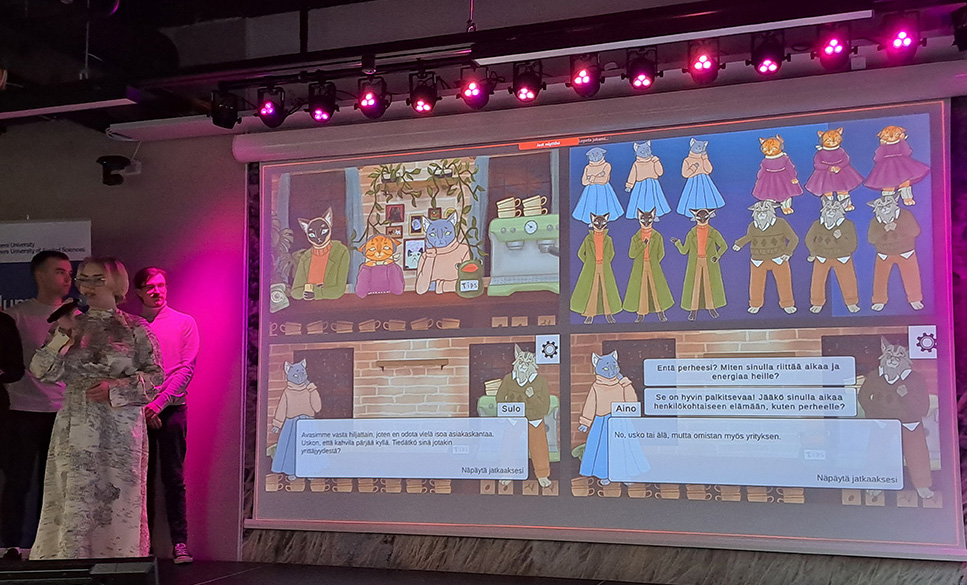In the spring of 2024, students in the first year of computer science at TAMK got to develop mobile games for the EduSTA project with the purpose to strengthen players’ knowledge of sustainable development goals and sustainability competences.
The game project culminated in a computer science (TIKO) game fair in May, where the teams presented their games. According to project expert Nina Eskola-Salin, cooperation with the students went very well from start to finish. All teams were successful in their goal and were able to achieve a finished, playable game.
– Great work by the whole team!
The games Green Factory, Harpoon Hero, The Green City, Responsible Shopping, A Sip of Meowrality and Baltic Blue Quest are available for download in the Google Play app store.
Games to support teaching
The Academy for Sustainable Future Educators (EduSTA) project aims to develop the sustainability competence of teachers. Project manager Eveliina Asikainen says that the goal of the game project was to create a game that teachers could use as support in teaching.
The idea was that students would choose one of the 2030 Agenda for Sustainable Development Goals as the basis for their own mobile game. In addition, the teams’ work was guided by the goal of supporting players’ sustainability expertise: systems thinking, futures literacy or value awareness.
Nina Eskola-Salin says that at first the students had challenges limiting their project to just one sustainable development goal. Eventually, however, all teams found some perspective on sustainability that piqued their interest.
The themes of the games included sustainable energy production, sustainable urban planning and sustainable consumption. Students were also interested in the Baltic Sea and its protection and social sustainability, such as gender equality.
According to Eskola-Salin, students were enthusiastic about the sustainability theme from the beginning and felt that the role of teachers in strengthening students’ sustainability skills is an important aspect.
A game can encourage reflection on inequality
The EduSTA project wanted to reward one student team at the game fair, which bravely chose a theme and game type that was slightly different from the others. Built in the form of a visual short story, A Sip of Meowrality takes place in a café where the owner and customers are human-like cats. The player guides the elderly owner of the café, serving coffee to various customers, listening to their stories and responding to them with given dialogues.
The purpose of the game is to make the player think about their own values. The game also teaches that when you help others by being compassionate, you often get something back yourself. The cafe starts to look better and gets more customers when the player makes the right decisions.
The game was developed by the 23TIKO1E team, which consisted of the Scrum Master Taru Salonen, artist Isaac Matilainen, and coders Joel Hämäläinen and Jose Mäntylä.
The game project teaches important work life skills
The game project is implemented in student teams. Each team chooses a Scrum Master, i.e. the team leader, coders and graphic designers. The game project progresses by sprint and during each sprint, a client meeting is arranged for the student teams with the client, in this case the experts of the EduSTA project.
In customer meetings, the idea of the game and content perspectives are sparred, the materials related to the theme are reviewed, and the visuality and gameplay of the games are considered. In addition to the client, a teacher of project studies and a director and sparring partner of the technical implementation of the games will be present at the meetings.
Additional information:
Eveliina Asikainen, Project Manager, eveliina.asikainen@tuni.fi
EduSTA-themed games can be found by name in the Google Play app store and on TAMK’s computer science students’ game portal.
In the EduSTA project, teachers’ sustainability competences are operationalised into practical actions by building a set of digital competence badges for teachers’ sustainability competencies as well as learning materials, studies and learning environments that support the performance of competence badges. The project is funded by Erasmus+ Teacher Academies and is running from 1 June 2022 to 31 May 2025.
Author: Tytti Juusti


